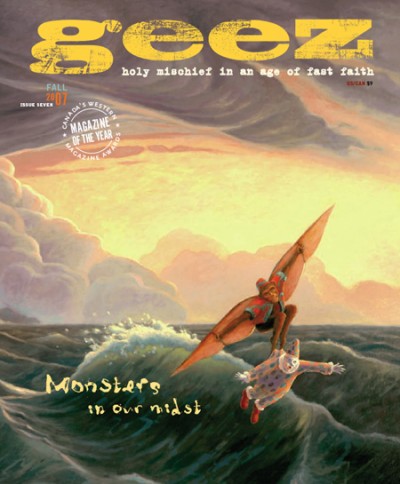Should we love Goliath?
We are right; they are wrong.
It’s a fundamental premise of most activism. We – the enlightened remnant – face off against the military-industrial complex, neo-con conspirators, suburban SUV drivers, or other favored Goliath. But is moralistic antagonism the path to a better world? Is it possible to address conflicts between the powerful and powerless without demonizing certain players?
Don’t get me wrong; I’m no mampy-pampby,
let’s-all-just-have-tea-together-and-love-will-prevail dreamer. I’ve yelled at riot police who were protecting pro-globalization heads of state, disrupted public meetings of an energy corporation, sat at a logging blockade, and been personally insulted by politicians. I know how to take the gloves off.
But recently, I’ve found myself cringing when fellow activists gloat over the stupidity of corporate executives or politicians. Sometimes I feel like the process of demonization – while it bolsters underdog egos – detracts from the goal of change. I’ve found myself hesitantly suggesting that we start viewing our presumed “adversaries” as something other than adversaries. At other times, I wonder if my non-adversarial musings are merely privileged naivety, detached from a world that demands an all-out, good-versus-evil battle.
Conflict
“You can’t shy away from conflict,” says Kevin Thomas. And he hasn’t. In 1998, logging giant Daishowa sued him and other members of Friends of the Lubicon for $20 million. The organization had convinced a number of companies to stop buying paper products from Daishowa, which was clear-cutting in the territory of the Lubicon Cree indigenous people in northern Alberta.
“I believe in giving [one’s opponents] every opportunity to do the right thing, but… ,” Thomas tells me from his Toronto home. So before the boycott, he says Daishowa was approached in a cooperative fashion. And in 1988 the company agreed to stay off Lubicon land. But later they reneged.
Friends of the Lubicon informed Daishowa of their intent to boycott, but the company continued logging. The boycott went ahead and legal action ensued. After a judge sided with Friends of the Lubicon in 1998, Daishowa officials sat down for a tense meeting with Thomas and his colleagues. The company agreed to stay off Lubicon land. This time the agreement has stuck. Confrontation achieved what the 1988 talks did not.
Sweatshop issues
Thomas also works on sweatshop issues with Maquila Solidarity Network. In this work, the picketing, shareholder actions and media campaigns are combined with ongoing face-to-face meetings with industry, government and labour officials. Though companies are increasingly open to these solutions-oriented multi-stakeholder talks, Thomas says “the jury is still out as to whether [this approach] is working.” He sees advantages in talking but also a danger that talking becomes an end in itself.
I asked Thomas about personal dynamics between him and his opponents. “In a sense it isn’t personal,” he says. The focus for him is the issue and what people can do to solve problems, not feelings about individuals. “I’m not there to make them into nice people but to hold them accountable,” Thomas says in his ever-mild manner.
When I ask about loving enemies he says, “Be wary of proposing psychological solutions to political problems.” Instead of leaning on esoteric platitudes like, “counter hate with love,” his approach is to say “this is the problem, this is what’s causing it, this is what can be done and these are the people responsible.” For him, loving enemies means respecting them enough to expect them to act honorably, and always being open to the possibility of change.
Evil bully
In her book, Changing the Bully Who Rules the World, Carol Bly warns against taking the edge off one’s adversaries. “One has accommodated evil,” she writes, “if one has tried to comfort oneself about some tiny aspect of a bully instead of standing up to him.” The duke-‘em-out activist part of me nods in agreement, while the biblically foolish part says the notion of loving one’s enemies should take me beyond the hardcore headspace Bly seems to appeal to.
“Even within hearts overwhlemed by evil,” writes novelist Alexander Solzhenitsyn, “one small bridgehead of good is retained; and even in the best of all hearts, there remains a small corner of evil.” He said, “the line separating good and evil passes not through states, nor between classes, nor between political parties either, but right through every human heart.”
Similarly, Gandhi rejected a polarized, judgmental approach to conflict. “The only devils in the world,” he said, “are those running around in our own hearts – that is where the battle should be fought.” That belief did not prevent him from directly and effectively confronting those he thought needed to be confronted, but it guided his approach.
A focus on entrenching one’s own rightness and harping on the wrongness of others may lead to ideological victories (usually self-proclaimed), but not necessarily change. This does not rule out conviction or confrontation, just the sort of demonization that turns righteousness into a spiritually corrosive force and distracts from change.
If my involvement in a conflict makes me a more bitter and caustic person – rather than a more humble and creative person – my approach is probably askew. As another test, I like to consider whether the way I treat my adversaries would make them likely to feel comfortable approaching me if they were ever to jump ship.
While I am still fairly sure I am mostly right on certain issues, I try not to waste energy on fostering a sense of moral superiority. I’m experimenting with letting go of the David and Goliath complex that some activists hold dear. Because sometimes I wonder if David could have done better than to eliminate the big man.
Will Braun is an editor of Geez magazine.



Sorry, comments are closed.